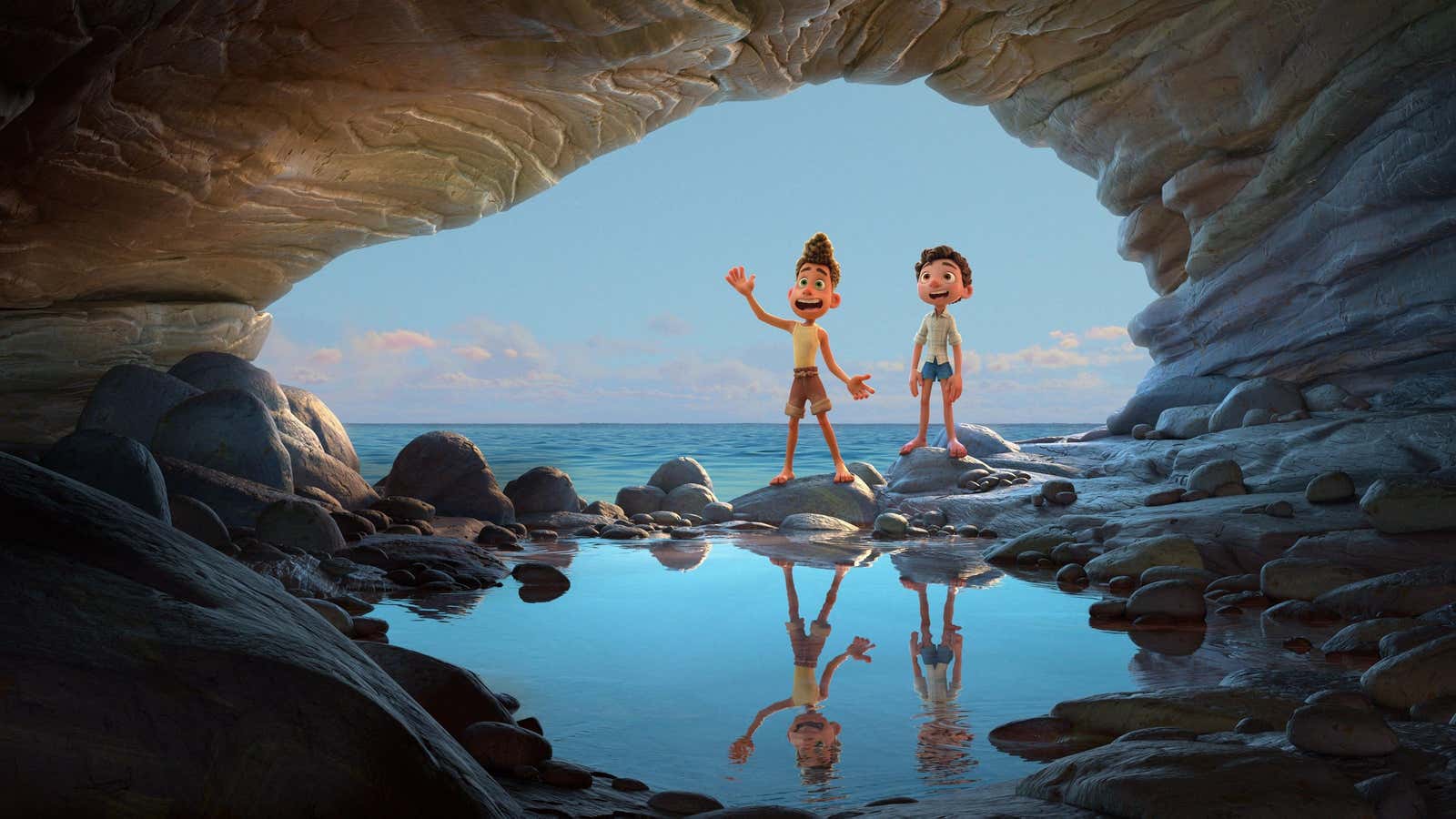It should come as no surprise that the underwater scenes in Pixar’s new movie, Luca, have a pleasing pastel shimmer: They’re so vivid, in their approximation of how light passes through the wavy blue, that you can almost feel the cool caress of the ocean against your eyeballs. Yet it’s not wonder, exactly, that the studio provokes with its latest secret world, a habitat of aquatic humanoids swimming off the Mediterranean coast. Nearly two decades after exploring the full splendor of life under the sea, Pixar has made the place look rather ordinary, an undistinguished corner of rock, algae, and blankly staring fish that bleat like sheep. What we mostly see down there is… water, photo-realistically rendered by the mightiest processing power in American animation.
To be fair, there’s a good rationale for muffling our oohs and aahs. Luca shows us the world below chiefly from the perspective of its title character, a nervous 13-year-old “sea monster” who’s lived there his whole life. Early into the film, Luca (Room’s Jacob Tremblay) defies his parents’ warnings about the dangers of the surface and—making like Tiktaalik before him—scampers onto dry land, his gills and green flesh suddenly, magically disguised. It’s here that he meets the devil-may-care Alberto (It’s Jack Dylan Grazer), another teenage merboy playing at human on the other side of the waves. The pair’s reward for their courage: a quaint Italian town, hostile to their kind but nonetheless brimming with tantalizing delights of the culinary and vehicular variety.
The generous read on Luca is that it has the sweet simplicity of a fairy tale, something that tired kids and the exhausted parents reading to them could follow even while on the verge of slumber. Less euphemistically, this is an exceptionally mild addition to the Pixar canon, pleasant but nearly as shallow as a bathtub. The screenwriters, Jesse Andrews and Mike Jones, are lightly riffing on a certain Hans Christian Andersen classic. But Disney proper’s take on The Little Mermaid took the time to express Ariel’s growing urge to be part of that world, with a big number that laid her yearning out plainly. Luca barely spares the time to establish its eponymous fishboy’s life or desires before his flippers touch sand; the character’s curiosity is painted in quick brushstrokes, like just about every motivation or conflict in this 95-minute wisp of a movie.
In the story department, Luca is at once busy and skimpy. The plot comes to involve Luca’s sitcom parents, voiced by Maya Rudolph and Jim Gaffigan, poking around the village in search of their son; a spunky human cyclist (Emma Berman) who befriends the incognito sea kids, and her gruff, one-armed, harpoon-brandishing father (Marco Barricelli); and a triathlon with a middle passage devoted to devouring pasta. Luca and Alberto enter the contest in the hopes of winning enough to buy a Vespa—a fantasy that plays more like product placement than a running gag. The trailer provoked tittering references to Call Me By Your Name, but there’s no romance in Luca, yet another buddy movie from the house that Woody and Buzz built. (Those who go deep diving for subtext might find something vaguely there in a tale of two boys passing as what they’re not in a small-minded town, but the metaphor is murky at best.)
Marine variations on expletives are what pass for verbal wit in Pixar’s literal fish-out-of-water story. The best jokes are visual—the slapstick fun of guppies teaching themselves how to walk upright, the quick costume change of sorts prompted by the two getting wet or dry. As for the film’s primary backdrop, it’s gorgeous, in a travel-agency-brochure kind of way—or maybe the manner of a stop on the “It’s A Small World” ride at Disneyland, just with more good-natured cultural stereotypes about a country that loves eating, arguing, kicking a ball around, and racing across cobblestone on two wheels. Director Enrico Casarosa, promoted to feature duty after scoring an Oscar nomination for the short “La Luna,” has cited everyone from Fellini to Miyazaki as influences. But in Luca, those creative heavyweights are but paints on a palette, swirled together into something cute and slightly indistinct and on Pixar model: a tropical blur of minor whimsy and carpe diem platitude.
